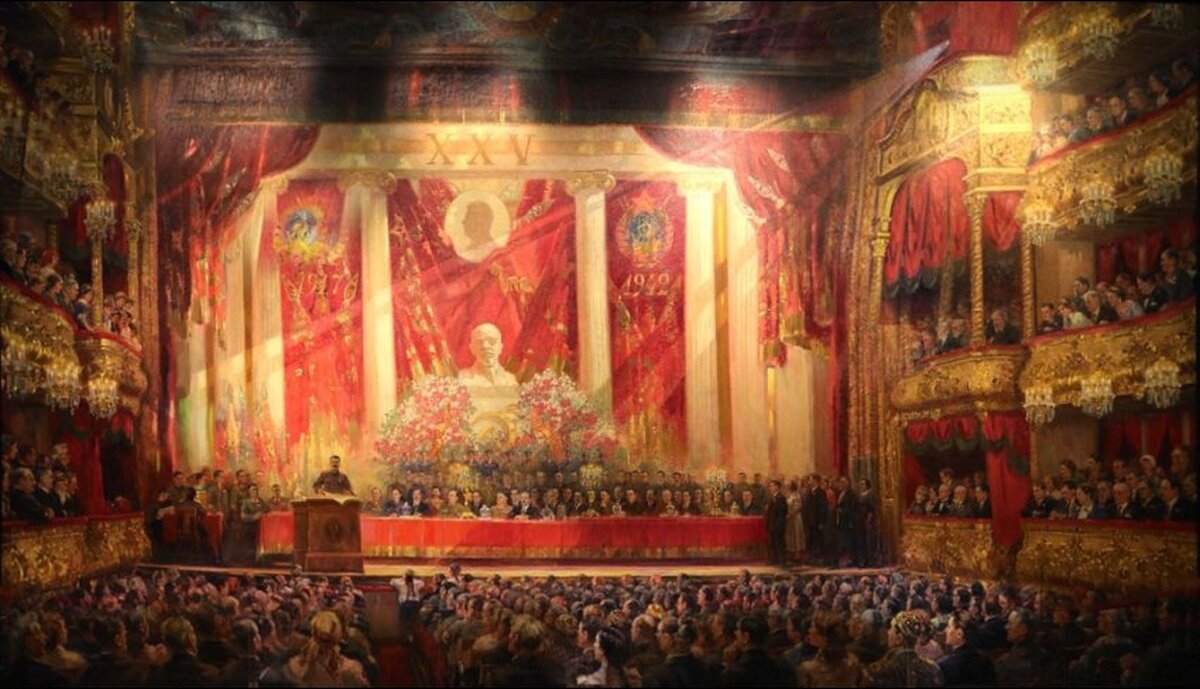
1. Not all Soviet writers were starving and suffering dissidents.. In Stalin's times, many of them were quite legal millionaires.. Some were purposefully fed by the authorities, others slyly exploited loopholes to enrich themselves, generously provided by a poorly regulated system of creative royalties and royalties. Colleague currency quotes an interesting article by Evgeny Zhirnov about the earnings of Soviet creators:https://monetam.livejournal.com/1700107.html
The question is, how and how much to pay cultural figures, stood before the Bolsheviks shortly after the dissolution of the Constituent Assembly elected by the people. They were conscious, that any illegitimate power is worth something only if, if he knows how to glorify himself. And therefore, along with the destruction of the open and secret enemies of the new system, they set about attracting representatives of the creative intelligentsia to their side., known as in the USSR, as well as in the rest of the world. Their word in support of the Bolsheviks was worth a lot, and the Soviet leadership was ready to pay quite dearly for it. So, figures of science and culture, who came during the famine years of the civil war to bow to Lenin and other Bolshevik leaders, provided rations. To guarantee celebrity loyalty, they were given letters of protection for vast apartments and mansions, and no responsible grassroots comrades could no longer condense them in accordance with the laws of the revolutionary time. So, world-famous singer Fyodor Chaliapin lived in his Moscow mansion on Novinsky Boulevard until his departure for foreign tours in 1922 year, of which he never returned to the USSR. To another world-famous Muscovite, director Konstantin Sergeevich Stanislavsky, instead of his house in Karetny Ryad, seized under the garage of the Council of People's Commissars, the Soviet government provided a mansion in Leontievsky Lane. Extensive real estate was later granted to prominent writers - the petrel of the revolution Gorky and Alexei Tolstoy, who almost got mired in the counter-revolution. They did not bypass the stars and cash payments. For example, at 1922 year with Gorky signed an agreement on the publication of collected works. And on the best paper and printing base - in Germany. Grandiose for its time was the fee of the proletarian writer who preferred to live abroad - 100 thousand gold rubles, which were not at all easy to find in a country that had just survived the war and famine. <…>Against the will of the leader of the world proletariat, the most important of the propaganda arts in the 1920s and 1930s was not cinema at all., for which there was not enough projection equipment, no copies of films. And not even a circus, references to which the propagandists blotted out from Lenin's quote: circus troupes performed only in more or less large cities, where decent fees were provided. But professional, semi-professional and completely amateurish theaters and drama studios existed everywhere. And in order to provide all this propaganda asset with an ideologically verified repertoire, the party went to create special material conditions for correct writing playwrights. AT 1924-1925 years, the people's commissariats of education of the union republics obliged theaters to conclude contracts with the authors for staging plays and pay a percentage of the fees. In the shortest possible time, the shortest writing playwrights turned into the richest people in the country. Their rapid enrichment annoyed everyone - from actors and directors to members of the Politburo. <…> Discontent grew in the ranks of the party and Soviet officials. According to the 1933 salary grid of responsible employees, their monthly earnings ranged from 250 to 500 rubles, while playwrights were earning thousands. However, Stalin was against the elimination of the system he created to stimulate creators.. He liked, that venerable and young writers sent him plays, humbly begged for reading and approval and promptly followed any instructions for editing. <…>AT [1950] year a new attack on the earnings of playwrights and other creators, who love easy money, undertaken by the leaders of the unions of writers and composers, together with the secretary of the Central Committee and the head of the department of agitation and propaganda Mikhail Suslov. The problem has changed from a purely political one to an economic one., because only for 1949 year deductions from performances and concerts in favor of the authors amounted to a grandiose amount - 35 million rubles. In September 1950 year the issue was considered by the Politburo, but Stalin rested in the south, and, knowing his attitude to this problem, associates did not dare to make any decision. Finally the question “On perversions in the payment of royalties for the right of public performance of literary, dramatic and musical works” sent for revision. <…>The appointed commission headed by Suslov prepared an extensive note by October, which it said: <…>“The current system of interest payments provides for the payment of playwrights, translators and dramatists for the public performance of their works 1,5 a percentage of the fee for each act of the play, going in the theaters of the RSFSR, regardless of the total number of productions performed. On average, for a play, the author receives from 4,5 to 7,5 percent of the gross harvest. Opera composers in most republics for a four-act opera are paid 5,25 percent of the sum, librettist — 2,75 percent; authors of symphonic and chamber works — 2 percent, authors of texts and music of mass songs - according to 1,5 percent. Authors receive such deductions for life., and after their death deductions for 15 years are received by heirs ... Established life (with the right to inherit) percentage deduction allows some authors to receive large sums of royalties for the same work for many years. The act-by-act payment of the fee leads to, that authors strive to create stage works with as many acts as possible, guided by non-artistic considerations, but by the interests of personal gain. The current practice of percentage deductions led to the exorbitant enrichment of individual playwrights, translators and dramatists. So, playwright Baryanov for the public performance of a play he wrote “On the other side” received only in 1949 about a million (920,7 thousand.) rubles of interest. The playwright Sofronov in the same year received 642,5 thousand. rubles, Tour brothers 759 thousand. rubles. The writer Simonov has received about 2500 thousand. rubles. Receiving from year to year for the performance of their works huge sums, some authors stop working on improving their skills and do not create new highly artistic dramatic works. Even greater perversions exist in the wages of translators and dramatists, who receive percentages on an equal footing with the authors of original works. So, translator Mingulina for the translation of the play “deep roots” received over the past three years 810 thousand. rub., Rubinstein for translations and adaptations of Viennese operettas - 670 thousand. rub., translator Zubova for translation “Pygmalion” B. Show received in the last four years 588 thousand. rub., translator Zhelyabuzhsky for staging the novel “Gadfly” Voynich for two and a half years - 650 thousand. rub.; Shchepkina-Kupernik for translations of several works by Shakespeare and Schiller over the past four and a half years has been paid in the form of interest payments of about 1300 thousand. rubles. Translations of plays, librettos for operas and musical comedies are often handled by unskilled people, in many cases they do not even know foreign languages. Using existing old translations, they make minor changes to them and become authors and co-authors of works, receiving large amounts of interest. This group of authors, lacking the talent and ability to create original works and engaging in reworkings of translations and dramatizations, often of poor quality, leads a parasitic existence at the expense of the state. So, eg, a certain Arkhipov (Zaitsev), not knowing any foreign language, received large sums for insignificant and unnecessary alterations of translations of plays by K. Goldons “Servant of two masters”, “innkeeper”, plays by Schiller “Deceit and love”, “Robbers” and others…”
Hundreds of thousands and millions of rubles earned not only playwrights and translators, but also some famous writers and their heirs. To become millionaires, it was enough for them to publish a multi-volume collected works with the most bloated text. (including letters, comments and so on). Taking into account the huge Soviet circulations, this gave a huge income. Comrade Suslov managed to solve the problem of millionaire creators only under Khrushchev:
clear, that the figures hurt the members of the ideological commission for the living. AT 1953-1954 years, top-ranking party workers were canceled the payment “allowance” - additional, tax-free salary in envelopes. And now the minister and the head of the department of the Central Committee received 6-8 thousand a month. And some writers and translators, and even more so to their heirs, got millions. The commission decided to deal with the heirs additionally. The certificate she received stated:”According to the royalty law, before 1958 of the year, writers' heirs 15 years received royalties in full. This led to their unjustified enrichment.. So, eg, Mayakovsky's heirs only in the post-war period received over 5 million rubles (the term for the use of copyright by Mayakovsky's heirs was established as an exception for life and only in 1955 year - through 25 years after the death of the poet - discontinued).Fifteen years after the death of A. M. The writer's heirs received Gorky only for his plays from above. 7 million rubles. Beyond that, only 1947 g. until the end of the copyright term (1951 city) they got for the books, published only in Goslitizdat, about 3 million rubles ... The heirs of A. n. Tolstoy (over 5 million rubles.). For the new edition of the collected works of A. n. Tolstoy in 10 volumes, started in 1958 year, heirs are entitled to an amount of about 5 million rubles. Now, in connection with the introduction of a new law on inheritance, this amount will be halved and will amount to about 2,5 million rubles. For the first published volumes, the heirs have already received 500 thousand. rubles. Term of use of copyright for compositions A. Tolstoy expires 31 December 1959 g. Considering, that the heirs. n. Tolstoy have already received huge amounts of royalties, it would be expedient to implement, on the basis of the relevant paragraph of the copyright law, the compulsory purchase of copyright in the works of A. n. Tolstoy and pay for the new edition no more than 500-700 thousand. rubles”.According to some details, other recipients of huge fees also came under pressure to, so that they voluntarily-compulsorily refuse the amounts specified in the publishing agreements. As Yakov Kranzfeld recalled, in the early 1960s, fees for collected works were reduced to ridiculous levels, and for the last volumes of Tarle's works the fee was several hundred rubles. true, the money saved went mainly to the production of political literature and royalties to its authors. Over time, everyone found ways to receive significant fees.. Gossips, eg, claimed, that the solid income of Eldar Ryazanov is not due to his films, and deductions for the plays of the same name in provincial theaters, written by him together with Emil Braginsky. The illusory nature of Suslov's victory was not only in this. Breaking the Stalinist system of taming and feeding “engineers of human souls”, he created a fertile environment for the development of dissidence. So that, perhaps, Stalin defended the idea to the last “financial support up to subsidies” not only out of senile stubbornness.
2. A literary scandal in the spirit of modern Western mores. Popular in feminist circles, the author turned out to be not even an author at all:https://shazoo.ru/2021/10/19/117001/pisatelnica-karmen-mola-okazalas-tremya-muzhchinami-oni-poluchili-priz-v-million-evro-feministki-nedovolny
A million euro prize lured three Spaniards to remove the veil of anonymity and reveal to the whole world, that they are behind a series of ultra-violent thrillers, presented as works “Spanish Elena Ferrante”.Three men published works under the pseudonym Carmen Mola, which can be roughly translated as “Cool Carmen”. <…>The main character of their series is Detective Elena Blanco., a peculiar and lonely woman, who loves grappa, karaoke, classic cars and having sex in an SUV.According to the writers, which 40-50 years, they didn't choose a pseudonym, to better sell books. They weren't hiding behind a woman, but behind the name. None of them expected, that thrillers will become popular. Especially, they didn't think, that this popularity is connected only with the name. Feminist, writer and activist Beatriz Gimeno attacked the trio for creating a female persona to publish books. she stated, that they used not only the name Carmen Mola, but also created a whole image of the mother of three children, who teaches algebra in the morning, and writes ultra-violent thrillers in the evenings. Feminist declared, that the authors are scammers. Last year, the Women's Institute Regional Branch recommended one of Carmen Mola's works for a collection of books from female writers, which help to understand “realities and experiences of women in different periods of history and draw attention to rights and freedoms.”
3. blogger mironkin writes in the comments about the problem of textbooks:https://olegmakarenko.ru/2252851.html?thread=825185331#t825185331
I have a pedagogical education, taught at the university and at school, so a little in the subject. Almost all modern pedagogy and teaching methods are completely out of touch with reality. Textbooks on these subjects are written by very respected people., candidate and doctoral dissertations are defended, scientific works are published ... However, all this is done in 99% cases people, never worked as teachers. Edition of textbooks, collections of exercises and problem books - a separate income item for the right people. Textbooks change editions, correcting a couple of pages at the very beginning, so that the pagination, assignments and exercises with the previous edition did not coincide in any way. Although, for good, additional tasks can be numbered by adding one more digit to the old number through a dot or a fraction, how it was done calmly in Soviet times, for example, in the collection of problems on Berman's mathematical analysis, which has withstood a thousand reprints with the addition of tasks and the preservation of numbering. As a result, it is difficult to reuse old textbooks along with new ones., and often impossible in reality.. This leads to increased sales, circulation, income of publishers and royalties of all this brethren, and even to GDP growth, but at the expense of parents.
Oleg Makarenko











